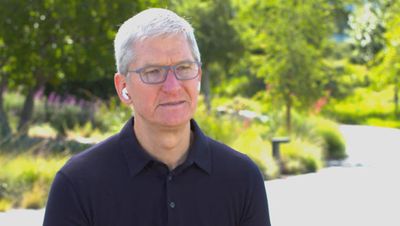Apple CEO Tim Cook has penned an op-ed for the Wall Street Journal, calling for more action to be taken against systemic racism and the need to speak up in light of the disproportionate impact that the pandemic has had on communities.

Cook's piece highlights how the pandemic has impacted various communities differently and draws on his personal experience of growing up during the civil rights movement.
In simple theory, a disease should affect all of us equally. But in plain fact, the opposite is true. We have all seen, in real time, how structural discrimination and obstacles to opportunity do their work in a crisis. In our communities, every burden—from rates of infection and care outcomes, to economic adversity, to the challenges of virtual learning when schools are closed—falls heaviest on those for whom true equity has always been farthest from reach. As someone who grew up during the civil-rights movement, it has been frustrating to see how much work is still to be done but heartening to see the degree to which people of good will have set aside comfort with the status quo to march and to demand something better.
As the end of the pandemic nears, Cook says it is a collective responsibility to ensure that moving forward, all individuals, communities, companies, and governments do everything they can to ensure a hopeful and "durable" future for all.
When the pandemic recedes, we can't simply assume that healing follows. It falls on all of us—individuals and communities, companies and governments—to ensure that what's ahead is not just the end of a disease but a durable and hopeful future for all who sacrificed and endured during this unprecedented time.
The global health crisis has forced millions of students to learn remotely from home, and Cook says Apple is committed to building "powerful learning tools and [sharing] them freely with tens of thousands of teachers, educators, and parents." Cook goes on to describe Apple's multiple investments for Black and underrepresented communities.
And it's led us to undertake major new investments through our Racial Equity and Justice Initiative. These projects include the Propel Center in Atlanta, which we're helping to build in partnership with the country's historically Black colleges and universities, to support the next generation of leaders of color in fields ranging from machine learning to app development, entrepreneurship to design; and our first Apple Developer Academy in the U.S., in downtown Detroit, home to more than 50,000 Black-owned businesses and no shortage of great ideas for the app economy.
Cook ends with a hopeful message, saying that if anything, he hopes this pandemic has taught us that there is a need to speak up and that a long history of injustice should not be used as an excuse to do nothing.
The old saying goes that the best time to plant a tree was 20 years ago, but the second best time is today. If this pandemic has taught us anything, I hope it’s that none of us can use injustice’s long history as an excuse not to act. Our lives on this planet are precious and fleeting, and fate has a way of reminding us that society is only as strong as those who, for too long, have gone overlooked and undervalued.
Cook's full op-ed can be read with a subscription to The Wall Street Journal.
Note: Due to the political or social nature of the discussion regarding this topic, the discussion thread is located in our Political News forum. All forum members and site visitors are welcome to read and follow the thread, but posting is limited to forum members with at least 100 posts.























